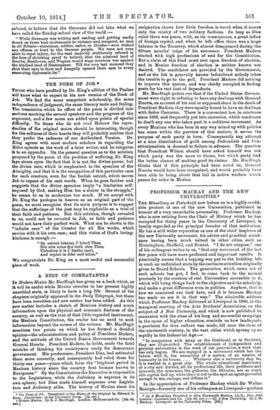A NEST OF COMBATANTS.t
IN Modern Mexico Mr. MacHugh has given us a book which, as it will be useful while Mexico remains in her present highly unsettled state, is likely to have a long life. Several of the chapters originally appeared in the Daily Telegraph, but these have been rewritten and new matter has been added. As this new matter includes a sketch of Mexican history and much information upon the physical and economic features of the country, as well as the text of that little-regarded instrument, the Mexican Constitution, the reader has no need to seek information beyond the covers of the volume. Mr. MacHugh mentions two points on which he has formed a decided opinion—the administration and policy of President Madero, and the attitude of the United States Government towards General Huerta. President Madero, he bolds, made the fatal mistake of thinking his countrymen ready for democratic government. His predecessor, President Diaz, had estimated them more correctly, and consequently had ruled them for thirty-one years—years which form the "brightest period in Mexican history since the country first became known to Europeans." By the Constitution the Executive is responsible to the Legislature, while the Judiciary is supreme in its own sphere; but Diaz made himself supreme over Legisla- ture and Judiciary alike. The history of Mexico since his • The Poem of Job. Translated in the Metre of the Original by Edward G. King. Cambridge: at the University Press. (Ss. net.) Modern Mexico. By B. J. MacHugh. London: Methuen and CO. (128. ed. net.) resignation shows how little freedom is worth when it means only the rivalry of two military factions. So long as Dias ruled there was peace, with, as its consequence, a great influx of foreign capital, and when he left office there was a large balance in the Treasury, which almost disappeared during the fifteen months' reign of his successor. President Madero started with high professions of zeal for the Constitution. But a claim of this kind must rest upon freedom of election, and in Mexico freedom of election is neither known nor desired. The candidates are provided by the Government, and as the list is generally known beforehand nobody takes the trouble to go to the poll. President Madero did nothing to improve this system, and was chiefly occupied in finding posts for his vast host of dependents.
Mr. MacHugh points out that if the United States Govern- ment were right in refusing to hare any dealings with General Huerta, on account of his real or supposed share in the death of President Madero, they were equally bound to have no dealings with Sefior Carranza. There is a convenient law, in existence since 1862, and frequently put into execution, which condemns to death any one who takes part in a seditious movement. As every Mexican who has been in any way mixed up with politics has come within the purview of this statute, it serves the purpose of each party in turn. Consequently any attempt at a nice distribution of guilt among Federalists and Con- stitutionalists is doomed to failure in advance. The question that President Wilson should have asked himself was not which party was the more to blame, but which party had the better chance of making good its claims. Mr. Jilacliugh thinks that if this principle had been acted on, General Fluerta would have been recognized, and would probably have been able to bring about that lull in active warfare which passes for order in Mexico.


































 Previous page
Previous page